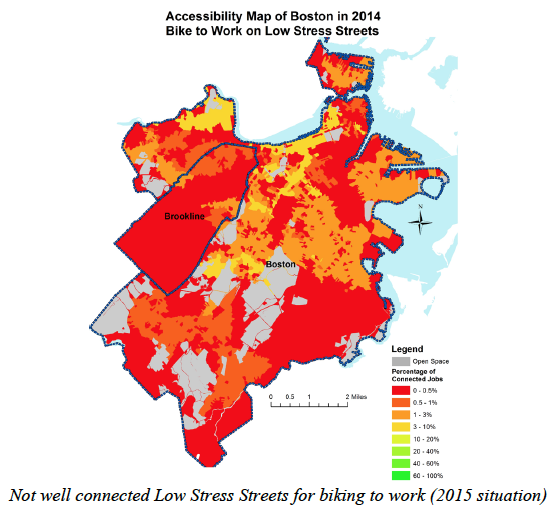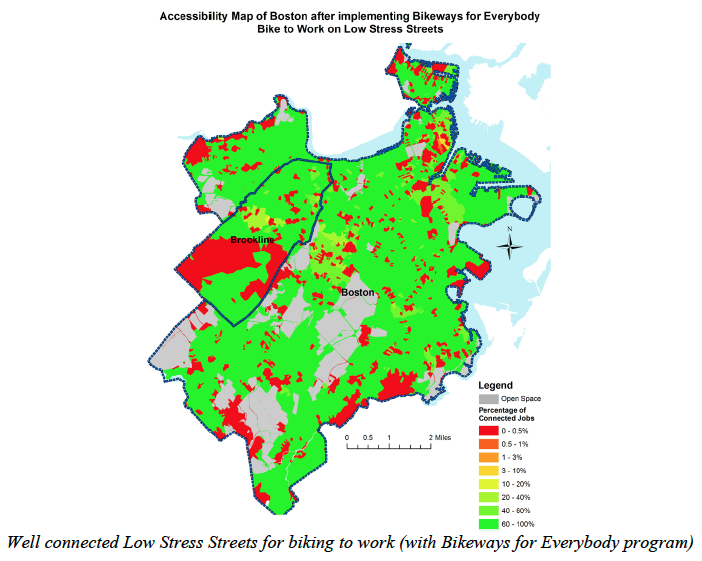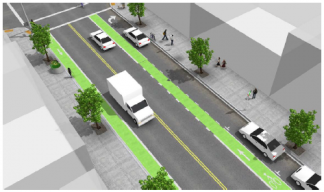The Boston City Council Committee on Parks, Recreation and Transportation released a report last week to summarize their findings from a series of policy briefings about city transportation. The goal of this series, assigned to the Committee by City Council President Michelle Wu, was to convene transportation policy experts, community advocates, and interested parties to discuss solutions to current transportation problems in Boston. The five policy briefings focused on:
- Low Stress Bicycle Networks
- Pedestrian Service and Safety
- Systematic Safety and VisionZero
- Transit Priority
- Parking Management
The series was chaired by Councilor Sal LaMattina and organized in partnership with Northeastern University Professor of Civil and Environmental Engineering Peter G. Furth. In releasing the report, Council President Wu stressed the positive impact improved transportation can have on the city:
“In addition to the pressing need to eliminate pedestrian and cyclist fatalities, transportation policy has important implications for the economic vitality of our city. Longer commute times are correlated with higher unemployment rates and lower odds of escaping poverty. By creating safe walking and cycling options and smoother transportation experiences for everyone in our city, we will not only be protecting the health and wellness of our residents but also working to decrease income inequality.”
Below is a brief summary of each topic. Read the full report and watch videos of each briefing here.
Low Stress Bicycle Network
For individuals who live and work in Boston, it’s nearly impossible to bike to work without using roads with high traffic stress. In 2015, it was calculated that the percentage of home to work commutes on low-stress streets was only 1.3%. Researchers have categorized and analyzed low-stress roads and identified key connections for creating low-stress commuting routes across the city. With these recommendations, the home-to-work bike connectivity can improve to 58.1%.


Pedestrian Service and Safety
The Committee recommends improved pedestrian safety by implementing safer crosswalks. This includes smart signal timing, curb extensions, raised crosswalks, narrower lane widths and more. By improving pedestrian safety, the city will strengthen a major mode of transportation and improve public health by promoting safe physical activity.

Systematic Safety and VisionZero
The VisionZero program aims to improve traffic safety with the ultimate goal of eliminating fatal and serious traffic crashes in the city. Professor Furth suggested speed control, converting 2+2 lanes to 1+1 lanes with turn pockets, separating bicycles from vehicles with colored bike lanes, and designing crosswalks to cross only one lane at a time.
Transit Priority
The MBTA does not have transit signal priority at intersections, meaning buses and green line trolleys lose a lot of time waiting at red lights. Prof. Furth compared Boston with other cities such as Zurich and Portland to show how signal priority can make Boston public transit faster and more reliable, thus attracting more drivers to use the MBTA.
Parking Management
Everyone wants to park close to their destination and nobody likes to pay for parking, but parking demands a lot of space, which is scarce and expensive in Boston. The Committee recommends a smarter parking management policy that sets parking rates to manage parking availability, not to generate revenue. Any revenues from parking rates and permits should be invested back into the neighborhood through local projects.




Dock Square Garage is over half empty every night! There are between 300 to 500 empty parking spaces empty EVERY NIGHT while residents are fighting and driving around for an hour trying to find street parking. This is not right! Parking Garages should be ticketed for empty parking spaces. These structures were built to store cars and they are not being used while residents suffer trying to find spaces on the street. Public parking garages should be required to have a electronic sign at the entrance that tells people how many total spaces the garage holds and how many spaces are empty. We have the technology to make this happen.
Don’t even get me started on installing smart traffic light technology that can read real time traffic and adjust the signals in real time.
Oh I forgot to mention if Public Parking Garage owners were ticketed for empty parking spaces they would be forced to lower the prices or pay more to have a empty parking garage. We have enough parking garage spaces to store all of downtown residents cars over night but its sitting empty. This is a waste of parking resources. IT NEEDS TO STOP! Anyone who reads this can go see for yourself. Go into any public parking garage in the evening or at night and count all the empty spaces. I bet there are THOUSANDS!!!
Also I am not a car owner and this is not one of my problems. I just feel so bad for people who drive around and around and fight for parking.